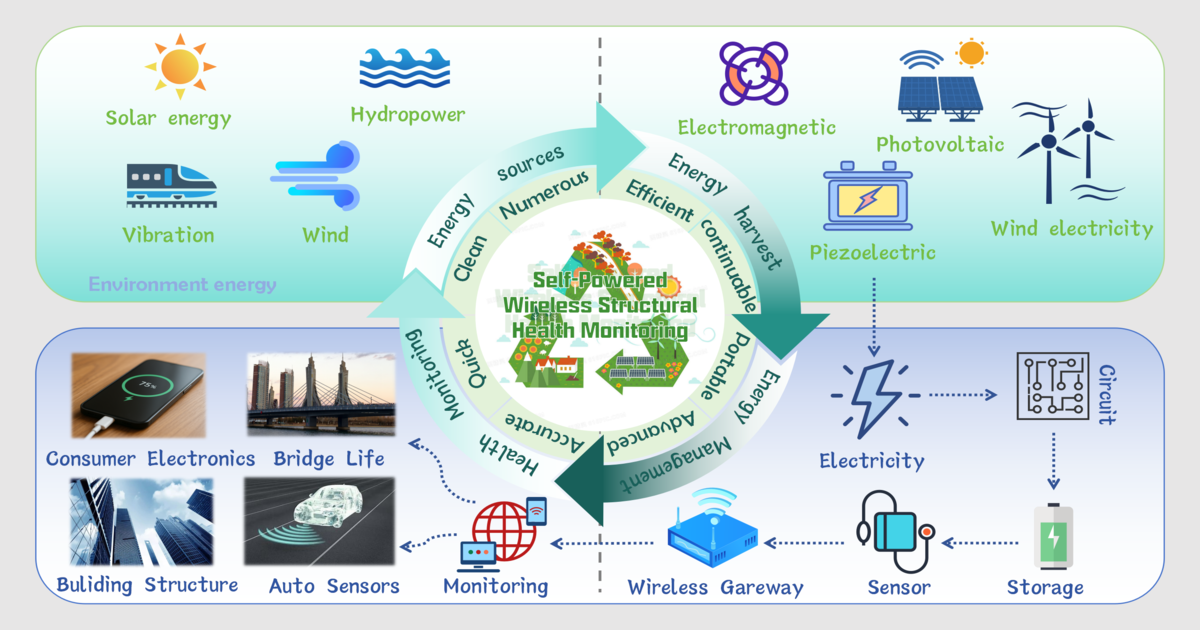Self-Powered Wireless Structural Health Monitoring Based on Energy Harvesting
A special issue of Sensors (ISSN 1424-8220). This special issue belongs to the section "Physical Sensors".
Deadline for manuscript submissions: closed (10 November 2025) | Viewed by 568

Special Issue Editors
Interests: smart materials and structures; piezoelectric energy harvesting
Special Issues, Collections and Topics in MDPI journals
Interests: smart materials and structures; energy harvesting from traffic systems; piezoelectric transducers
Special Issues, Collections and Topics in MDPI journals
Interests: vibration energy harvesting; nonlinear dynamics; flow-induced vibration; liquid sloshing induced vibration; piezoelectric transducers
Interests: smart materials and structures; piezoelectric energy harvesting
Special Issues, Collections and Topics in MDPI journals
Special Issue Information
Dear Colleagues,
Structural health monitoring (SHM) is essential for ensuring the safety, reliability, and longevity of critical infrastructure such as bridges, buildings, and aircraft. However, traditional SHM systems often face challenges related to energy consumption, wiring complexity, and operational sustainability. Self-powered wireless SHM systems, based on energy harvesting technologies, provide an innovative and sustainable solution by utilizing ambient energy sources such as vibration, thermal gradients, and wind and solar energy. These systems eliminate the reliance on external power sources while enabling real-time monitoring and data transmission.
This Special Issue aims to showcase state-of-the-art research and development in this interdisciplinary field. We seek contributions that explore novel energy harvesting methods, advanced sensor technologies, wireless communication protocols, data analysis techniques, and applications in various engineering settings. The issue intends to highlight innovations that can transform SHM systems into fully autonomous, scalable, and sustainable solutions.
We warmly invite researchers and practitioners to submit original research articles, reviews, and case studies to this Special Issue, fostering advancements in self-powered wireless SHM systems and promoting their widespread adoption in infrastructure monitoring
Prof. Dr. Hongjun Xiang
Dr. Jianjun Wang
Dr. Wan Sun
Dr. Zhiwei Zhang
Dr. Lipeng He
Guest Editors
Manuscript Submission Information
Manuscripts should be submitted online at www.mdpi.com by registering and logging in to this website. Once you are registered, click here to go to the submission form. Manuscripts can be submitted until the deadline. All submissions that pass pre-check are peer-reviewed. Accepted papers will be published continuously in the journal (as soon as accepted) and will be listed together on the special issue website. Research articles, review articles as well as short communications are invited. For planned papers, a title and short abstract (about 250 words) can be sent to the Editorial Office for assessment.
Submitted manuscripts should not have been published previously, nor be under consideration for publication elsewhere (except conference proceedings papers). All manuscripts are thoroughly refereed through a single-blind peer-review process. A guide for authors and other relevant information for submission of manuscripts is available on the Instructions for Authors page. Sensors is an international peer-reviewed open access semimonthly journal published by MDPI.
Please visit the Instructions for Authors page before submitting a manuscript. The Article Processing Charge (APC) for publication in this open access journal is 2600 CHF (Swiss Francs). Submitted papers should be well formatted and use good English. Authors may use MDPI's English editing service prior to publication or during author revisions.
Keywords
- structural health monitoring (SHM)
- energy harvesting
- nonlinear dynamics in energy harvesting
- nonlinear interface circuits
- self-powered sensors/actuators/systems
- wireless sensor networks
- infrastructure monitoring
- Internet of Things
- energy harvesting in remote sensing and monitoring applications
- other topics related to energy harvesting
Benefits of Publishing in a Special Issue
- Ease of navigation: Grouping papers by topic helps scholars navigate broad scope journals more efficiently.
- Greater discoverability: Special Issues support the reach and impact of scientific research. Articles in Special Issues are more discoverable and cited more frequently.
- Expansion of research network: Special Issues facilitate connections among authors, fostering scientific collaborations.
- External promotion: Articles in Special Issues are often promoted through the journal's social media, increasing their visibility.
- Reprint: MDPI Books provides the opportunity to republish successful Special Issues in book format, both online and in print.
Further information on MDPI's Special Issue policies can be found here.










